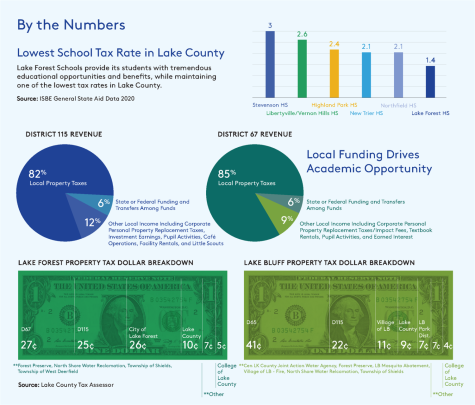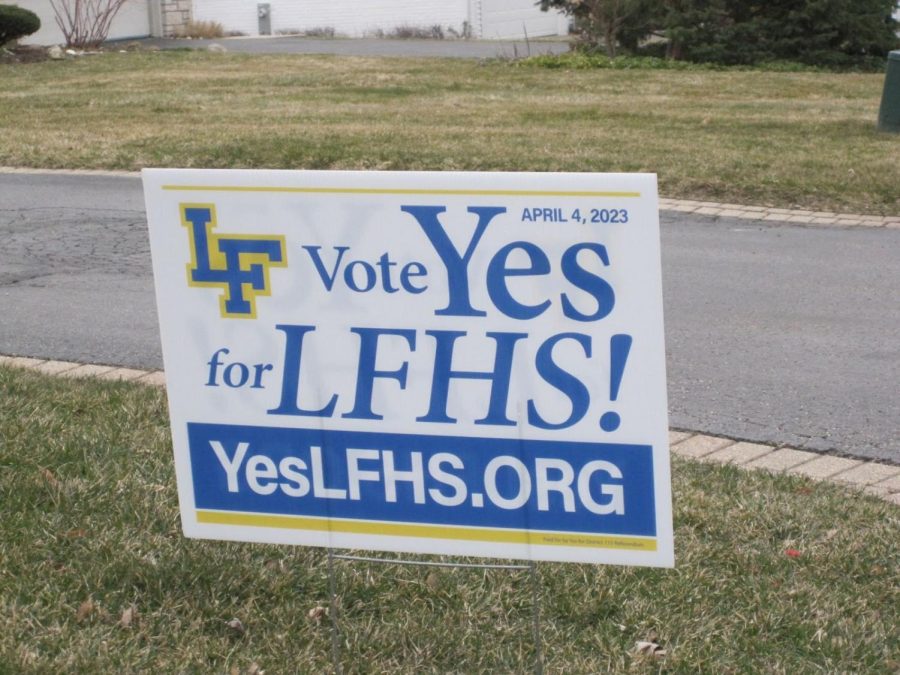A guide for first-time student-voters in the 2023 referendum election
A large investment into the education system, D115’s referendum is an issue that many seniors, who are first-time voters, will cast their ballot on
March 23, 2023
Alongside the fresh air of spring and newly green front lawns are yard signs featuring the “Say YES to LFHS!” slogan — supporting the District 115 referendum, which will appear on this year’s local election ballot.
Lake County’s D115 school district residents across Lake Forest, Lake Bluff, and Knollwood will vote April 4 on a $105.7 million referendum.
The referendum aims to renovate aging infrastructure in the school, such as plumbing, windows, and roofing, among other updates. It also prioritizes other instructional developments, from increasing safety and security measures to improving student support services.
Since the midterm elections earlier this year, the referendum will be one of the first voting experiences for most seniors. Those who turn 18 before April 4 will have a chance to cast their ballot for the local election.
Senior Lilliana Walsh, a first-time voter, said she is voting “yes” to the referendum because it will create a more accessible environment in the school.
“At a school board meeting I attended, the Board of Education talked a lot about the priority of accessibility in the referendum,” said Walsh. “As a future alum of LFHS, I want my school to reflect modern standards of technology and support for students and staff with disabilities.”
However, many students are unaware of the referendum’s potential implications on the building and community. Though the referendum impacts student resources and their learning, it will not directly affect current seniors. All renovations are expected to be done during summer breaks over four to five years, beginning in the summer of 2024.
“While it might not impact the 18 year-olds now, future students and future generations could be impacted,” said D115 Superintendent Dr. Matthew Montgomery.
After LFHS was built in 1935, 88 years later, many of its resources are outdated, administrators say. Most infrastructure systems and classrooms have not been updated for decades: the last time boilers were replaced was in 1992, while many electrical panels and switch gears haven’t been updated since the ‘60s.
The last referendum plan passed in 2006 and cost about $54.6 million, which, adjusted for inflation, would be $79.2 million today. It focused on constructing the Commons, the music wing, the cafeteria, and innovating and improving about 50% of classrooms. The current referendum addresses the remaining 50% of classrooms, and other infrastructure needs in order to make LFHS a “healthier, safer, and more secure high school.”
The referendum plan also includes improving integral features for high school learning, such as science and media labs, ADA (Americans with Disabilities Act) accessibility, and classroom maintenance in about 54 teaching spaces. For example, it will address code issues that protect students and staff with disabilities through upgrades to restrooms, drinking fountains, and ramp slopes.
The renovation plans to support what Montgomery called a “historic and iconic landmark building” have involved students who participated in a Master Facility Planning Committee preceding his tenure to give their input on the referendum.
“We wanted to get the student voice in the planning process, and these voices are what brought these concerns to life,” said Montgomery. “Students said they feel that they are going ‘back in time’ when using science labs in the high school.”
However, some community members are opposed to voting for the referendum. Preserving and updating an almost century-old high school carries a high price, which means higher taxes for residents.
Citizens who live in Lake County District 115 are expected to pay an additional $476 in property taxes per year on a $500,000 home and $976 per year on a $1 million home over the next 20 years. Students can see the financial impact of the referendum by using the District’s tax calculator.
Beyond costliness, implementing new resources is a difficult and time-consuming process, though most renovations will take place during summer breaks. While the referendum plan won’t interfere with student learning during the school year, it is still a timely and costly investment.

Though junior Ana Dollard is not of voting age, she expressed concern over the referendum’s high cost.
“Putting all this money and time into something where we can’t see the result is a risky decision because of the stakes involved,” she said. “It is frustrating and a little bit sad that we won’t see the impacts of the referendum until years later.”
If the referendum is approved, the District will further engage the community output by creating a Construction Oversight Committee, where citizens of Lake Forest, Lake Bluff, and Knollwood can participate in the design and construction phases of the work. Additionally, the Board plans to utilize District communication channels to provide referendum updates to the community regularly.
If the referendum fails to pass, the Board of Education will likely try again on a future ballot. However, other possibilities include pulling money from existing programs and funds to pay for the high-priority infrastructure needs.
If the District chooses to put the referendum back on a future ballot, the cost, and subsequently, taxes, will likely increase due to inflation and escalation costs, says Montgomery.
Nevertheless, students and community members can provide their input and participate in civic engagement by voting on April 4. The polls will be open from 6 a.m. through 7 p.m. Students who wish to register to vote can do so in person at locations such as the Lake Bluff Public Library or Lake Forest City Hall anytime before or on election day.
Montgomery hopes that regardless of what students vote for, they use their experience to continue educating themselves during elections, whether in local, state, or federal initiatives.
“I want students to take away that voting is a civic duty and an opportunity to influence government in a way that protects our democracy,” said Montgomery. “We want to produce students who embody the traits of the portrait of a learner. Voting embraces so many of those values, such as empathy, communication, and critical thinking.”







